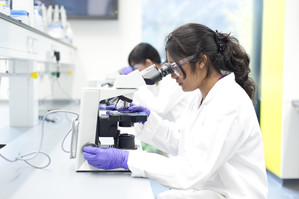Open access resource provides most comprehensive library for biological protein interactions
17 August 2020

Researchers looking for up to date information about protein interactions within cells will benefit from a new open source resource created by academics at the University of Reading.
PINOT, the Protein Interaction Network Online Tool, is an open access resource which provides researchers with an easy to use platform for querying information about protein-protein interactions (also referred to as PPIs).
Users are able to submit a list of proteins of interest, PINOT then collates PPI information from seven manually curated external databases, merges and filters these data to provide the user with a list of scored interactions relevant to the submitted list of proteins.
Dr James Tomkins, the lead researcher on the project, from the School of Pharmacy at the University of Reading said:
“PINOT is a bit like an online directory. The tool enables you to identify a catalogue of protein interactions that relate to your proteins of interest, and it will then present data presented with assigned confidence scores.”
“PINOT captures the full extent of high quality reported protein interaction data from curated databases. We’ve built the resource with a focus on transparency and data traceability. All data provided to the user are fully linked to source publications.”
Fundamental cellular processes
Inside all living cells is a dynamic landscape of proteins which convey biological messages by physically interacting. These protein-protein interactions (or PPIs) underpin fundamental processes that maintain cell health, and disruption to these processes can lead to the development of disease states.
Due to the importance of PPIs in cell biology, extensive efforts over many decades have been focussed on experimentally detecting PPIs in order to understand how cells function and how dysfunction within cells leads to disease. This links to an ultimate aim, to develop therapeutics to target and rescue impaired cell function in disease states.
Dr Tomkins said:
“This wealth of data, which is being generated around the world, has great potential for understanding the complexity of biology at a molecular level, when considered collectively. However, collating and processing these data from numerous databases, for protein interaction network analysis for example – an approach used to assess connectivity of many proteins, is challenging and time consuming.”
“It’s on this basis that we created PINOT, to automate the process. We’ve made the underlying computing code available for more technical users to modify if they desire, recognising that the tool will hopefully evolve over time.”
Currently, PINOT is available for obtaining PPI data for two species, human and C. elegans – a small nematode worm widely used for genetic and cell biology research, including here at Reading.
PINOT is available for researchers to use now, and is available at:
http://www.reading.ac.uk/bioinf/PINOT/PINOT_form.html
A video explaining about PINOT is available to watch here
Full citation: Tomkins, J.E., Ferrari, R., Vavouraki, N. et al. PINOT: an intuitive resource for integrating protein-protein interactions. Cell Commun Signal 18, 92 (2020). https://doi.org/10.1186/s12964-020-00554-5
